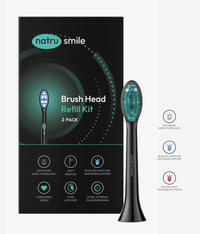
All products are certified by dental expert Dr. Greg Grillo
Did you know that pregnancy can cause women to experience sensitive teeth, mouth pain, and even bleeding in the gums? Sensitive teeth during early pregnancy is a symptom that is lesser-known but commonly experienced among pregnant women.
Pregnancy hormones can cause the gums to swell, leading to tooth sensitivity. In this article, we’ll discuss why sensitive teeth during pregnancy are so common, as well as how to effectively manage the discomfort.
Why Do Women Experience Sensitive Teeth During Pregnancy
Pregnant women may experience sensitive teeth due to a variety of reasons related to the natural changes their bodies undergo. Causes can include:
- Hormonal changes. An increase in hormones such as estrogen and progesterone during pregnancy can cause the gums to become swollen and lead to plaque growing on the teeth, which causes teeth to be more sensitive.
- Increased blood flow. Pregnancy causes blood flow to increase in the body. As a result, the nerves in the teeth become more sensitive, especially to certain kinds of foods.
- Morning sickness. Morning sickness adds acidity to the mouth, which wears down tooth enamel and causes sensitive teeth. Early pregnancy symptoms like morning sickness are one reason why pregnant women commonly experience tooth sensitivity.
- Dry mouth. A dry mouth can cause plaque to build up on the teeth more quickly, making teeth more sensitive and causing tooth pain.
- Bruxism. Grinding your teeth, or bruxism, often results from stress. Women commonly exhibit bruxism due to pregnancy and postpartum stress, which negatively impacts oral health.
- Sugary foods. It’s no secret that pregnant women tend to have strong and specific food cravings. Cravings for sugary foods can lead to a buildup of bacteria that can cause tooth decay and gum disease.
The Connection Between Tooth Sensitivity And Pregnancy
Pregnancy often brings with it heightened tooth sensitivity, due to the physiological changes a woman's body undergoes. An increase in hormones and other natural symptoms of pregnancy can negatively affect oral health – creating an apparent conflict between pregnancy and good dental hygiene.
For instance, increased blood flow in the body causes more sensitive nerves in the teeth when eating strong–tasting foods – leading to higher tooth sensitivity than normal.
Pregnancy symptoms like morning sickness and food cravings can also have an impact on tooth sensitivity due to the way that pregnancy affects women's bodies. Nevertheless, pregnant women can still maintain their oral health through proper dental care practices such as regular brushing and flossing.
Good oral health is essential for both mother and baby during pregnancy and to avoid sensitive teeth. When we don’t take care of our mouths, it can lead to worn enamel and exposed tooth roots, which is what causes sensitivity.
Maintaining good oral care can also reduce the risk of dental problems in unborn babies, as well as lower the chance of other health issues or pregnancy complications.
Research has demonstrated that pregnant women with periodontitis (gum infections) are more likely to experience preterm labor and deliver a low–birth–weight infant, while poor oral care may increase the likelihood of gestational diabetes – an ailment that affects both mom and baby.
How To Treat Sensitive Teeth During Pregnancy
Tooth sensitivity can be a sign of more serious dental issues, such as decay. Tooth extractions during pregnancy aren’t ideal, so it’s best to take care of your teeth preemptively and consult your dentist if you experience severe pain.
Here are some tips to help manage sensitive teeth while expecting:
Use A Soft-Bristled Toothbrush
Brushing teeth is key for pregnant women, but rough toothbrushes can be irritating for those with sensitive teeth. Soft–bristled brushes are gentler on the gums and keep teeth clean and plaque–free. These brushes should be used to avoid any irritation from regular dental care.
Change Your Toothpaste
If you're pregnant and feeling increased sensitivity in your teeth, certain toothpaste varieties may actually worsen the discomfort. Fortunately, there are desensitizing agents available in specially–formulated sensitive toothpastes that can help reduce pain. Be sure to check labels for artificial sweeteners or other unnecessary ingredients before buying.
Floss Daily
Maintaining excellent oral health during pregnancy is essential. Twice–daily brushing and good dental hygiene are key for expectant mothers, while regular flossing helps avert tooth sensitivity by eliminating plaque and food particles between teeth. Neglecting to floss increases the likelihood of infection or cavities, resulting in additional discomfort.
Daily Saltwater Rinses
Saltwater rinses are an effective way to clear bacteria from the mouth and prevent dental issues. They also stimulate saliva production, which acts as a guard against decay and sensitivity. This is especially relevant for pregnant women, who should take extra care in avoiding tooth sensitivity or more severe consequences caused by bacterial accumulation and plaque build–up.
Say No To All Alcohol-Based Mouthwash
Pregnant women should be aware of the risks associated with using alcohol–based mouthwash. Not only can it lead to dehydration and exacerbate tooth issues, but its use could potentially cause harm to an unborn baby. It is, therefore, essential that this type of mouthwash is avoided in order to ensure good dental health and protect against any potential risk.
Read more here: Non-Alcoholic Mouthwash
Avoid Foods That Cause Sensitivity
Foods that are acidic, spicy, or sweet can all be detrimental to dental health and increase tooth sensitivity. Pregnant women should therefore avoid these items and opt for healthier alternatives in order to maintain optimal oral hygiene.
However, eliminating these foods can be challenging due to common pregnancy cravings for strongly–flavored foods. If expectant mothers do consume spicy or sweet foods, it's important they rinse, brush, and floss immediately after eating in order to minimize the effects on their teeth.
Avoid Sugary Drinks
Pregnant women should be mindful of their dental health and avoid consuming sugary drinks to minimize tooth sensitivity. As teeth are already more porous during pregnancy, these sweet beverages can have a detrimental effect on the enamel. Opting for water or other sugar–free alternatives is best, while brushing after consuming sugary drinks may help reduce any negative impacts.
Maintain A Positive Diet
Good nutrition during pregnancy is paramount. Fruits, vegetables, and grains are a must for keeping your mouth in top condition. Dairy products provide calcium to strengthen the enamel on teeth, while drinking plenty of water helps keep your mouth clean and minimizes the risk of cavities.
Be Mindful Of The Products You Use
To safeguard expectant mothers and their unborn children from potential harm, it is critical to use only natural products designed for dental care during pregnancy. Artificial colorings and flavorings present in many such items can be detrimental to health; hence, should be avoided.
Additionally, pregnant women should avoid teeth whitening during pregnancy as the chemicals used can cause excessive irritation in the teeth and gums and be harmful to oral health.
Now that you know how to avoid tooth sensitivity during pregnancy, here are some frequently asked questions about it.
Can Sensitive Teeth Be An Early Sign Of Pregnancy?
Hormonal fluctuations that occur during pregnancy can lead to tooth sensitivity, making it a potential early indicator of pregnancy. It is not uncommon for pregnant women to experience changes in their teeth before or while they are expecting. Although there may be several causes of this phenomenon, the hormonal imbalances associated with pregnancy often result in heightened tooth sensitivity.
How Early Does Teeth And Gum Sensitivity Start In Pregnancy?
Pregnancy can trigger gum sensitivity or even bleeding in the first trimester. Sudden tooth sensitivity during pregnancy can occur at any point, however. Hormone fluctuations make gums more sensitive and prone to bleeding; this is normal and should not be a source of worry. With correct dental hygiene practices, as well as taking measures to prevent aggravating the sensitivity, it usually resolves itself.
Is Tooth Sensitivity Common In Pregnancy?
It's a surprise to many, but tooth sensitivity is actually quite common during pregnancy – up to 75% of pregnant women experience gingivitis or some degree of sensitivity. This can be attributed to hormonal fluctuations and can easily be managed with good dental hygiene and nutrition.
Do Your Gums And Teeth Hurt During Pregnancy?
Pregnant women may feel occasional discomfort in their gums and teeth due to increased sensitivity. This is usually a sign of gingivitis, which is a normal pregnancy symptom that can be managed through good oral hygiene practices and pain relief measures. It's essential to visit the dentist if any tooth or gum pain persists, as this could indicate something more serious than typical pregnancy symptoms.
Should I Be Worried About Tooth Sensitivity During Pregnancy?
Pregnancy can bring about natural changes to the body, one of which is tooth sensitivity. Although this should not cause concern, it is essential to maintain good dental hygiene during pregnancy for optimal oral health.
Expectant mothers are at risk of more serious tooth problems and decay due to changes in oral health from pregnancy; they often experience gum disease and cavities as a result.
This highlights the importance of good dental hygiene during pregnancy, as this can have an impact on the baby's future oral health.
Tips For Coping With Sensitive Teeth During Pregnancy
Unfortunately, sensitive teeth can be a source of pain, but there are ways to manage it. Specialized toothpastes and mouthwashes designed for sensitive teeth may provide relief. Applying cold compresses or ice packs to the area can also help ease discomfort.
Additionally, avoiding highly acidic foods that could aggravate sensitivity is an important step in reducing symptoms. If your tooth pain is persistent and severe, it's a good idea to see your dentist – they may just need dental treatment such as extraction during pregnancy (which is safe for pregnant women).
Conclusion
Pregnancy brings with it a heightened risk of dental issues, so proper oral hygiene is an essential part of protecting one's health. Expectant mothers may experience increased sensitivity in their teeth, but taking extra care when it comes to brushing and flossing can help prevent cavities or other problems from arising during this special time.
Thankfully, there are many simple actions that pregnant women can take to reduce tooth sensitivity: avoiding acidic foods and brushing your teeth regularly will help prevent cavities and limit pain resulting from sensitivity. If you're experiencing persistent and excessive pain, however, it's important to see your dentist – good dental care is essential for the health of both mother and baby.












